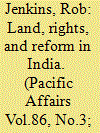| Srl | Item |
| 1 |
ID:
137817


|
|
|
|
|
| Summary/Abstract |
What accounts for the variation in the influence of scientists in the policy-making process? Why is it that scientists sometimes appear to exercise significant autonomy in shaping policy agendas, while at other times very little? Scientists are most influential, this paper contends, when they can leverage their recognized expertise by strategically co-opting institutionalized channels of advice. This is most likely to occur in issue areas of high complexity and ambiguity when key policy makers are dependent upon scientists for their counsel. Policy entrepreneurs within competing scientific communities, prevented from accessing key decision makers, wait until windows of opportunity open to undermine the credibility of the incumbent experts, gain access to political leaders, and refocus the policy agenda. This theory is developed and tested through a case-study analysis of the nuclear test-ban debate during the Eisenhower administration from 1954 to 1958. The findings of this paper underscore the need to treat foreign policy decision making as a series of strategic interactions between multiple actors with a broader capacity to influence the policy-making process than traditionally conceived. By doing so, scholars can better understand variations in government decision making across time and issue area, providing important insights into the role of experts in a wide range of public policy domains.
|
|
|
|
|
|
|
|
|
|
|
|
|
|
|
|
| 2 |
ID:
128535


|
|
|
|
|
| Publication |
2013.
|
| Summary/Abstract |
India's legal regime governing the compulsory acquisition of private land by the state for "public purposes" - centered on the Land Acquisition Act 1894 (LAA) - has long been criticized for breeding corruption and insufficiently protecting landowners and local communities. Attempts to overhaul the LAA have faced stiff resistance from powerful interests within and outside the state. When the United Progressive Alliance government took power in 2004, few would have guessed that it would seek to replace the LAA with legislation that imposes more rigorous standards for the compulsory acquisition of land and detailed rules for rehabilitating displaced people. Yet, in 2011 the government introduced the Land Acquisition, Rehabilitation and Resettlement Bill (LARRB). This article argues (1) that the LARRB displays certain distinctive characteristics shared by other rights-related statutes enacted under the UPA government; (2) that the emergence of this distinctive - and unforeseen - piece of legislation was driven largely by India's approach to creating Special Economic Zones; and (3) that both the LARRB's content and the process by which it was introduced have implications for debates of wider theoretical significance, including the increasingly hybrid nature of rights, and the desirability of combining insights from the literatures on "policy feedback" and "policy entrepreneurs."
|
|
|
|
|
|
|
|
|
|
|
|
|
|
|
|